| 1 October |
• yesterday • tomorrow |
| Memorial of Saint Thérèse of the Child Jesus, Virgin and Doctor of the Church |
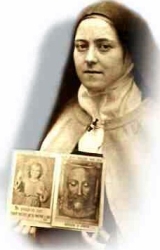
• Francoise-Marie Therese Martin
• Teresa of the Infant Jesus
• the Little Flower of Jesus
• the Little Flower
• Thérèse of the Child Jesus
Born to a pious middle-class French family of tradesmen; daughter of Blessed Louis Martin and Blessed Marie-Azelie Guérin Martin, and all four of her sisters became nuns. Her mother died when Francoise-Marie was only four, and the family moved to Lisieux, Normandy, France to be closer to family. Cured from an illness at age eight when a statue of the Blessed Virgin smiled at her. Educated by the Benedictine nuns of Notre-Dame-du-Pre. Confirmed there at age eleven. Just before her 14th birthday she received a vision of the Child Jesus; she immediately understood the great sacrifice that had been made for her, and developed an unshakeable faith. Tried to join the Carmelites, but was turned down due to her age. Pilgrim to Rome, Italy at for the Jubilee of Pope Leo XIII whom she met and who knew of her desire to become a nun. Joined the Carmelites at Lisieux on 9 April 1888 at age 15, taking her final vow on 8 September 1890 at age 17. Known by all for her complete devotion to spiritual development and to the austerities of the Carmelite rule. Due to health problems resulting from her ongoing fight with tuberculosis, her superiors ordered her not to fast. Novice mistress at age 20. At age 22 she was ordered by her prioress to begin writing her memories and ideas, which material would turn into the book History of a Soul. Therese defined her path to God and holiness as The Little Way, which consisted of child-like love and trust in God. She had an on-going correspondence with Carmelite missionaries in China, often stating how much she wanted to come work with them. Many miracles attributed to her. Declared a Doctor of the Church in 1997 by Pope John Paul II.
2 January 1873 at Alcon, Normandy, France as Francoise-Marie Therese Martin
7pm Thursday 30 September 1897 at Lisieux, France of tuberculosis
17 May 1925 by Pope Pius XI
• African missions
• sick people; against bodily ills, illness or sickness
• AIDS patients
• air crews or pilots; aviators
• Australia
• black missions
• florists and flower growers
• foreign missions (proclaimed on 14 December 1927 by Pope Pius XI)
• loss of parents
• missionaries
• parish missions
• restoration of religious freedom in Russia
• tuberculosis
• World Youth Day 2013
• France (1944 by Pope Pius XII)
• Russia
• Anchorage, Alaska, archdiocese of
• Cheyenne, Wyoming, diocese of
• Churchill - Baie d'Hudson, Manitoba, diocese of
• Fairbanks, Alaska, diocese of
• Fresno, California, diocese of
• Hamilton, Bermuda, diocese of
• Juneau, Alaska, diocese of
• Kisumu, Kenya, diocese of
• Corner Brook and Labrador, Newfoundland, diocese of
• Pueblo, Colorado, diocese of
• Witbank, South Africa, diocese of
• Apostleship of Prayer
• YouTube PlayList
• The Story of a Soul (audio book)
For me, prayer is a surge of the heart; it is a simple look turned toward heaven, it is a cry of recognition and of love, embracing both trial and joy. - Saint Therese of Lisieux
What beauty? I don't see my beauty at all; I see only the graces I've received from God. You always misunderstand me; you don't know, then, that I'm only a little seedling, a little almond. - Saint Therese of Lisieux
You know well enough that Our Lord does not look so much at the greatness of our actions, nor even at their difficulty, but at the love with which we do them. - Saint Therese of Lisieux
Oh! no, you will see, it will be like a shower of roses. After my death, you will go to the mail box, and you will find many consolations. - Saint Therese on 9 June 1897 after Sister Marie of the Sacred Heart told her we would be very sorry after she died
https://catholicsaints.info/saint-therese-of-lisieux/
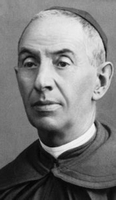
Aloisius, Aloysius
Eighth of eleven children. His father died when Luigi was twelve years old. To support the family he made wooden craft items. After hours he gathered other devout craftsmen and farmers at his shop to form the prayer group The Company of the Sacred Heart of Jesus; the locals called them The Company of Friars. The group expanded their ministry to work with the poor and sick, and in 1846 Luigi took private vows of chastity and obedience, dedicating his life to God.
However, Luigi lived in a time of political paranoia. He and the other members of his Company were charged with meeting to conspire against the Austrian forces occupying his village. In 1851 the they were jailed in Milan for ten weeks, finally released when it became obvious they were a religious, not political group.
Joined the Sons of Mary Immaculate, spending six years as a novice. Studied nursing. Worked with the sick in the cholera epidemic in Brescia, Italy in 1855. With the help of Father Luigi Dossi, he founded The Congregation of the Sons of the Immaculate Conception, dedicated to care for the sick. Initially worked with the Capuchin Fathers, who were forming a similar group. Certified as a phlebotomist by the La Sapienza University, Rome, Italy. In 1877, with the help of Pope Blessed Pius IX, Luigi finally founded his Congregation; he worked as its leader the rest of his life. The Sons willingly walked into the worst of epidemics, working in places that others were scared to go, giving their own beds to the sick. Luigi founded small communities throughout the region where men served in hospitals and as travelling nurses to the scattered, impoverished farmers. In 1882 they expanded their mission and founded orphanages with attached schools.
Though a layman all his life, Luigi was known as "Father" by the members of the Congregation and those he helped. He died at the age of 75, nearly blind, completely worn out, and working for the Congregation to the end.
24 July 1825 at Bovisio Masciago, diocese of Milian, Italy
1 October 1900 in Saronno, Varese, Italy of natural causes
• 9 November 2003 by Pope John Paul II
• his beatification miracle involved the healing of Giovanni Luigi Iecle, a farmer from Bosa, Sardegna in 1961
I would spend hours before Jesus in the Blessed Sacrament, but they were all hours without a drop of heavenly dew; my heart remained arid, cold, and unmoved. I was on the verge of abandoning everything, when, alone in my room, I heard a clear and distinct inner voice saying to me:
"Luigi, go to the choir in church and present your tribulations once again to the Blessed Sacrament."
I heeded this inspiration and hastened to follow it. I knelt down and after a short time - what wonder! I saw two personages in human form. I recognized them. It was Jesus with His Most Holy Mother, who approached me and in a loud voice said to me:
"Luigi, much indeed will you still have to suffer; other varied and greater battles will you face. Be strong; you will emerge victorious from everything; never lacking to you will be our powerful help. Continue the way you began."
Thus did they speak and then disappeared. - Blessed Luigi, describing his vision
https://catholicsaints.info/blessed-luigi-maria-monti/
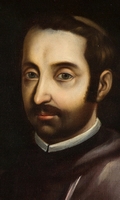
Born the illegitimate son of an Aragonese noble, Jaime de Palafox, the Marquis of Ariaza; his father would not recognize him, his mother became a Carmelite nun, and Juan was raised by a family of millers. When the boy was ten years old, his father finally acknowledged him and took over his upbringing. Juan was educated at Alcalá and Salamanca, and served as a political administrator in Monzón, Spain in 1626. Member of the Council of the Indies, the body that administered the overseas territory of the Spanish Empire.
Juan was ordained a priest in April 1629. He served as chaplain to the Holy Roman Empress, Maria of Austria, who was also the sister of King Philip IV of Spain, and travelled with her around Europe. Chosen bishop of Tlaxcala, México on 3 October 1639 by Pope Urban VIII, he served for nearly 14 years, including as interim Archbishop of Mexico from 10 June 1642 to 23 November 1642. Part of his time was served as viceroy to King Philip. He founded the Biblioteca Palafoxiana library on 5 September 1646 with 5,000 volumes, the College of San Pedro, the College of San Pablo, the Dominican convent of Santa Inez, the Purísima Concepción girl's school, and he completed construction of the cathedral for Tlexcala. While he supported missionary work among the natives of his diocese, he forbade any attempt to force or coerce conversion.
Bishop Juan became involved in struggle with the Jesuits in New Spain over church financing, and whether the Jesuits would submit to his authority. The Jesuits refused to do so, and had the support of the new viceroy. After much political wrangling, including appeals to the Vatican, Juan was recalled to Spain and chosen bishop of the Diocese of Osma in Old Castile, Spain from 16 August 1653 until his death six years later. His writings, part of which concerned what he perceived to be lax theological standards of Jesuit missionaries, ran to 15 published volumes.
24 June 1600 in Fitero, Navarra, Spain
1 October 1659 in Osma, Soria, Spain of natural causes
• 5 June 2011 by Pope Benedict XVI
• recognition celebrated at the Cathedral of La Asunción, El Burgo de Osma, Spain by Cardinal Angelo Amato
https://catholicsaints.info/blessed-juan-de-palafox-mendoza/
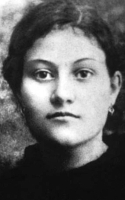
Maria Angela
Youngest of eleven children, Cecilia was baptized at the age of 9 days, and her father died when she was 2 months old. On 6 January 1915 the family moved to a small farm near Nepi, Italy, and came under the care of a maternal uncle. Cecilia received Confirmation on 27 May 1917, and made her First Communion on 2 October 1917. She was educated in a Cistercian convent school. In 1922 she joined the ''Servants of Mary'' (''Servites'') as a secular tertiary, receiving the scapular at the San Tolomeo ai Servi church, and taking the name ''Maria Angela''. Member of ''Catholic Action''.
Cecilia was drawn to religious life, and against her family's wishes, she became a Servite postulant in 1923. She studied in Rome, Pistoia and Zara from 1923 to 1926, hoping to become a missionary, but contracted tuberculosis and on 23 October 1926 returned to the family farm. Though her health deteriorated, she became known for her spiritual insights, and was a counselor to seminarians and members of ''Catholic Action''; local priests would ask her opinion on homilies they were planning. Her spiritual director, the Servite priest Gabriele Roschini, instructed her to keep a journal of her life and relationship with Christ. It covered the period 29 May 1927 to 12 September 1928 and was published as "Storia di un Pagliaccio" ("Story of a Clown").
17 February 1910 in Monte Romano, Viterbo, Italy
• 1 October 1928 in Nepi, Viterbo, Italy of tuberculosis
• she predicted the date of her death following a dream about Saint Thérèse of Lisieux
• she died singing a hymn to the Blessed Virgin Mary
• re-interred at the church of San Tolomeo ai Servi, Nepi on 16 March 1944
• 17 June 2012 by Pope Benedict XVI
• beatification celebrated at the Piazza della Bottata in Nepi, Italy by Cardinal Angelo Amato
• the beatification miracle involved the healing of Tommaso Ricci on 4 August 1959 from injuries received in what should have been a fatal traffic accident
https://catholicsaints.info/blessed-cecilia-eusepi/

• Allowin
• Bavon of Ghent
Belgian nobleman who spent a wild youth, noted for selfishness; known to have sold his servants as slaves to local noble houses. Married. Widower. Converted after hearing a sermon by Saint Amand of Maastricht. Built an abbey on his estate, called Saint Peter's in his day and Saint Bavo's today. He turned it over to Saint Amand, and became a monk in the house. He finally gave his estate to the house, his belongings to the poor, and lived as a recluse in a hollow tree and later a cell in the forest near the abbey.
589 at Brabant, Liege, Belgium as Allowin
654 at Saint Bavo's abbey of natural causes
• Ghent, Belgium
• Haarlem, Netherlands, city of
• Haalem-Amsterdam, Netherlands, diocese of
• Netherlands
• duke hunting with a falcon or hawk on his wrist
• prince giving alms in front of his palace
• hermit near hollow tree
• hermit with staff and a glove (which is probably related to falconry)
• man near a wagon
• man standing near a huge stone
• man with a purse or giving alms
• man with an angel holding a palm above him
• man with sword and scepter
• old king in armor near a book, broken tree trunk, ship, and Saint Bavo's monastery
https://catholicsaints.info/saint-bavo-of-ghent/
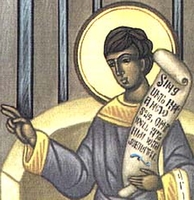
• Romanos the Melode
• Romanos l'Hymnographe
• Romanos Melodhos
• Romanos Melodist
• Psaitis Dhikeosinis
• Righteous Chanter
• Sweet Singer
• Romain, Romano, Romanus, Glykophonos
Convert to Christianity from Judaism. Deacon, serving at the Church of the Resurrection in Beirut, Lebanon, and at Constantinople. Wrote hundreds of hymns in simple language, appealing to the hearts of the faithful. Of the thousand or so that he wrote, only 60 to 80 survive – but they are still sung today.
c.490 in Syria
c.556 of natural causes
cantors
• young deacon in the middle of a church holding a scroll of a kontakion surrounded by church heirarchy and/or nobility and/or saints
• young deacon holding a church and an incense censer
https://catholicsaints.info/saint-romanos-the-melodist/
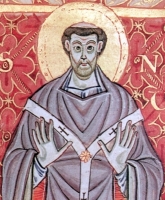
Nicetus, Nizier, Niketius
Born to a Gallo-Roman family, he was a religious youth. Monk at Limoges. Abbot. Knew and was highly thought of by King Theodoric I. Bishop of Trier, Gaul (part of modern Germany) in 532. A reformer and revitalizer, Nicetius rebuilt the cathedral and worked to bring back love of the faith in an area that was indifferently Christian. He travelled his diocese, preaching daily and speaking out against low morals of both commoners and aristocracy. Excommunicated King Clotaire I for the king's immorality; Clotaire exiled him. Attended the synods of Clermont in 535 and 549, Orleans in 549, Toul in 550, and Paris in 555. Reformed the clergy in his see, restoring discipline and stamping out clerical vice. Fought heresy, especially Monophysitism.
latter 5th century at Auvergne, France
• c.566 of natural causes
• buried in the church of Saint Maximin at Trier, Germany
https://catholicsaints.info/saint-nicetius-of-trier/
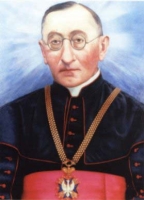
12 June as one of the 108 Martyrs of World War II
Priest in the diocese of Sandomierz, Poland. Taught theology at the Sandomierz seminary. Founded the Daughters of the Seraphic Saint Francis. Arrested in March 1942 by the Gestapo and deported to the Dachau concentration camp as part of the Nazi persecutions of Catholics.
6 January 1868 in Samborzec, Poland
tortured to death on 1 October 1942 at the Dachau concentration camp, Bavaria, Germany
13 June 1999 by Pope John Paul II at Warsaw, Poland
The most characteristic virtues of this priest: humility, truthfulness and great goodness, which were heroic in him, make him a candidate for altars. - Father Wincenty Granat
Under extreme and difficult conditions, he was able to agree with God’s will and see the salvific value in his sufferings. - Father Konrad Szweda
https://catholicsaints.info/blessed-antoni-rewera/
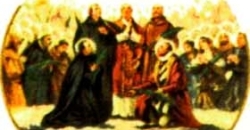
• Gerald Edwards
• Gerard Edwards
• Edward Campion
• 29 October as one of the Martyrs of Douai
• 1 December as one of the Martyrs of Oxford University
Raised Protestant. Educated at Saint John's College, Oxford, but was not awarded a degree because he would not acknowledge the queen as the head of Christianity in England. Converted to Catholicism. Seminarian at Rheims and Rome, Italy. Ordained in 1583, he returned to England in 1585 to minister to covert Catholics. Imprisoned four and a half years with Blessed Ralph Crockett in Marshalsea prison in London. Executed for the crime of being a priest.
at Breaston, Derbyshire, England
hanged, drawn, and quartered on 1 October 1588 at Chichester, West Sussex, England
15 December 1929 by Pope Pius XI
https://catholicsaints.info/blessed-edward-james/

29 October as one of the Martyrs of Douai
School and spiritual student of Blessed Nicholas Garlick in Tideswell, England. He began studying for the priesthood in Reims, France in 1582, and then at the English College in Rome, Italy in 1584. He was ordained a priest on 26 October 1586. In September 1587 he returned to England to minister to covert Catholics during the persecutions of Queen Elizabeth I. He was arrested in November 1587, imprisoned in Marshalsea, and condemned to death for the crime of being a priest. One of the Oaten Hill Martyrs.
1562 in Tideswell, Derbyshire, England
hanged, drawn and quartered 1 October 1588 in Canterbury, Kent, England
15 December 1929 by Pope Pius XI
https://catholicsaints.info/blessed-christopher-buxton/
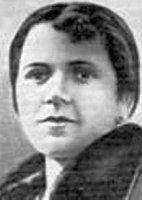
Fiorenza, Florence
Lay women in the archdiocese of Valencia, Spain. Textile worker. President of the Union of Spanish Catholic Women in Valencia, a member of Catholic Action and the Daughters of Mary. Franciscan tertiary. Had a devotion to Saint Therese of Lisieux, and worked to spread devotion to her. Catechist. Known for her strong prayer life. Imprisoned and martyred in the Spanish Civil War for the crime of being a loyal Catholic.
• 20 February 1890 in Caudete, Albacete, Spain
• baptized the same day
shot on 2 October 1936 in Rotglá i Corbera, Játiva, Valencia, Spain
11 March 2001 by Pope John Paul II
https://catholicsaints.info/blessed-florencia-caerols-martinez/

Rodolfo
29 October as one of the Martyrs of Douai
Educated at Christ College, University of Cambridge and at Glouscester Hall at the University of Oxford in England. Taught at Tibnam in Norfolk, England, and then at Littlehampton in Sussex, England. Studied at the seminary at Rheims, France. Ordained in 1585. Returning to England, he was arrested on board ship at Littlehampton on 19 April 1586 and sent to Marshalsea prison in London. Condemned on 30 September 1588 for the crime of being a priest in England. Martyr.
Barton-on-the-Hill, Cheshire, England
hanged on 1 October 1588 in Chichester, West Sussex, England
15 December 1929 by Pope Pius XI
https://catholicsaints.info/blessed-ralph-crockett/
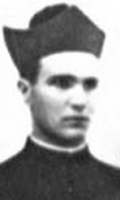
Baptized at the age of two days. Member of the Salesians of Don Bosco, making his profession at Carabanchel Alto in Madrid, Spain on 10 July 1927. He studied for the priesthood there and in then in Turin, Italy, and was a sub-deacon when the Spanish Civil War began. When he returned to Madrid on a break, he was spotted as a religious brother, imprisoned and eventually murdered by anti-Catholic forces. Martyr.
11 February 1908 in Vimianzo, La Coruña, Spain
shot on 1 October 1936 in Madrid, Spain
28 October 2007 by Pope Benedict XVI
https://catholicsaints.info/blessed-carmelo-juan-perez-rodriguez/
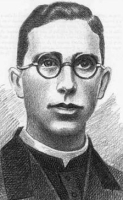
Member of the Salesians of Don Bosco. Studied at the seminary of Campello, Alicante, Spain, and then in Turin, Italy. Ordained in 1934. When the Spanish Civil War broke out, Father Álvaro fled to Cocentaina, Spain and went into hiding with his parents, but was found, briefly imprisoned and then executed. Martyr.
26 April 1908 in Alcocer de Planes, Alicante, Spain
during the night of 1 to 2 October 1936 in on the side of the road outside Villena, Alicante, Spain
11 March 2001 by Pope John Paul II
https://catholicsaints.info/blessed-alvaro-sanjuan-canet/

29 October as one of the Martyrs of Douai
Married layman. Father of Francis who became a priest. Widower. Studied for the priesthood at Rheims, France, and was in his 50's when ordained in 1585. Returned to England to serve his old neighbours. Arrested in Lowestoft, imprisoned in London for two years, and martyred for the crime of priesthood.
c.1530 at Ferrensby, West Riding, Yorkshire, England
hanged, drawn and quartered on 1 October 1588 at Ipswich, Suffolk, England
15 December 1929 by Pope Pius XI
https://catholicsaints.info/blessed-john-robinson/
6 November as one of the Martyrs of the Spanish Civil War
Cousin of Blessed Juan de Mata Díez. Higinio grew up a pious child, attending Mass and praying the Rosary daily. At age 25 he began working at house of the Salesians of Don Bosco in Carabanchal Alto, Spain, and became a postulent to the Order. When the anti–Christian persecutions of the Spanish Civil War began, he went into hiding, but was found and murdered. Martyr.
20 January 1909 in Ubierna, Burgos, Spain
shot on 1 October 1936 in Madrid, Spain
28 October 2007 by Pope Benedict XVI
https://catholicsaints.info/blessed-higinio-de-mata-diez/

Piat, Piato, Piatone
Priest, ordained by Saint Dionysius the Areopagite. Early evangelist to the areas of Tournai, Belgium and Chartres in Gaul (modern France). Martyred in the persecutions of Emperor Maximian Herculeus.
at Benevento, Italy
• skull split by a soldier c.286 at Tournai, Belgium
• body discovered in the 7th century by Saint Eligius, who made a reliquary for them
• interred at Chartres, France
• miracles reported at his tomb
Tournai, Belgium
https://catholicsaints.info/saint-piaton/

29 October as one of the Martyrs of Douai
Studied for the priesthood in Rheims, France. Ordained in 1585. He returned to England in 1586 to work with covert Catholics in Kent during a period of persecutions. Martyr.
1558 Chester, Cheshire, England
hanged, drawn and quartered 1 October 1588 in Canterbury, Kent, England
15 December 1929 by Pope Pius XI
https://catholicsaints.info/blessed-robert-wilcox/

1 December as one of the Martyrs of Oxford University
Studied in Oxford, England. Tutor to the sons of the Earl of Northumberland. Arrested for aiding a Catholic priest. Martyr.
Widmerpool, Nottinghamshire, England
hanged, drawn and quartered 1 October 1588 in Canterbury, Kent, England
15 December 1929 by Pope Pius XI
https://catholicsaints.info/blessed-robert-widmerpool/
• Gaspar Ueda Hikojiro
• Caspar Fisogiro
10 September (one of the 205 Martyrs of Japan)
Layman in the archdiocese of Nagasaki, Japan who sheltered Dominican missionaries. Member of the Confraternity of the Rosary. Marytr.
Japan
1 October 1617 at Nagasaki, Japan
7 May 1867 by Pope Blessed Pius IX
https://catholicsaints.info/blessed-gaspar-fisogiro/
• Andreas Yoshida
• Andrew Gioscinda
10 September (one of the 205 Martyrs of Japan)
Layman in the archdiocese of Nagasaki, Japan who sheltered Dominican missionaries. Member of the Confraternity of the Rosary. Marytr.
Japanese
1 October 1617 at Nagasaki, Japan
7 May 1867 by Pope Blessed Pius IX
https://catholicsaints.info/blessed-andrew-sushinda/
Vasnulfo, Wasnan, Wasnulfo
Seventh-century priest and noted preacher. Missionary to the Hainault region (along the border of modern Belgium and France) at the invitation of Count Vincent of Hainault. Miracle worker.
Scotland
• c.651 in Condé-sur-l'Escaut in Hainaut, Austrasian (in modern France)
• buried in Condé-sur-l'Escaut
Condé-sur-l'Escaut, France
https://catholicsaints.info/saint-wasnulf/
Franciscan friars and missionaries in the Caribbean. Martyred with a companion whose name has not come down to us.
• shot with arrows in 1516 on the modern Haitian side of the island of Hispaniola
• bodies eaten by the killers; head and clothing displayed as trophies
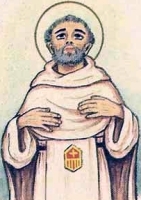
Mercedarian friar at the convent of Santa Maria di Montflorite in Aragon, Spain. Commander of his house. Priest.
buried at the convent of Santa Maria di Montflorite in Aragon, Spain
https://catholicsaints.info/blessed-dominic-of-villanova/
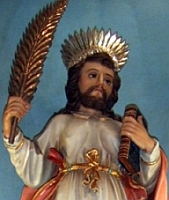
Martyred with his sisters Saint Julia of Lisbon and Saint Maxima of Lisbon in the persecution of Diocletian.
c.304 in Lisbon, Portugal
https://catholicsaints.info/saint-verissimus-of-lisbon/
Layman in the diocese of Burgos, Spain. Martyred in the Spanish Civil War.
11 February 1903 in Ubierna, Burgos, Spain
1 October 1936 in Madrid, Spain
28 October 2007 by Pope Benedict XVI
https://catholicsaints.info/blessed-juan-mata-diez/
• Aizan of Ethiopia
• Abreha of...
Brother of Saint Sazan; friend of Saint Athanasius of Alexandria. Chieftain in Abyssinia (modern Ethiopia). Worked to spread Christianity in Africa.
https://catholicsaints.info/saint-aizan-of-abyssinia/
Martyred with her sister Saint Julia of Lisbon and brother Saint Verissimus of Lisbon in the persecution of Diocletian.
c.304 in Lisbon, Portugal
https://catholicsaints.info/saint-maxima-of-lisbon/
Martyred with her brother Saint Verissimus of Lisbon and sister Saint Maxima of Lisbon in the persecution of Diocletian.
c.304 in Lisbon, Portugal
https://catholicsaints.info/saint-julia-of-lisbon/
Brother of Saint Aizan; friend of Saint Athanasius of Alexandria. Chieftain in Abyssinia (modern Ethiopia). Worked to spread Christianity in Africa.
https://catholicsaints.info/saint-sazan-of-abyssinia/
Arethas
Martyred with 504 other Christians whose names have not come down to us.
Rome, Italy
https://catholicsaints.info/saint-aretas/
Restored the monastery of Rathlin Ireland, Ireland after one of the many Viking raids.
762
https://catholicsaints.info/saint-fidharleus/
Martyr.
martyred at Tomi (modern Constanta, Romania)
https://catholicsaints.info/saint-crescens-1-october/
Martyr.
Tomi (modern Constanta, Romania)
https://catholicsaints.info/saint-evagrius/
Martyr.
Tomi (modern Constanta, Romania)
https://catholicsaints.info/saint-priscus/
• Holy Protection of the Mother of God
CatholicSaints.Info Portable Edition